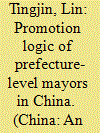| Srl | Item |
| 1 |
ID:
122991


|
|
|
|
|
| Publication |
2013.
|
| Summary/Abstract |
Based on human capital theory, this article views the choice of major as an investment in human capital, and uses quantitative methods to analyse the choice of major of Mainland Chinese students when studying higher education abroad, and their affecting factors. The data used in this study, which sampled 12,961 Mainland Chinese senior secondary school students, are from a data set from a project subsidised by the Research Grant Committee of Hong Kong. Economic factors, such as expected economic return and expected employment prospects have significant effects on Chinese students' choice of major, after controlling factors relating to individual characteristics and family background. Furthermore, this article, using the case of China, provides feedback for the human capital theory and also proposes policy implications for developing and developed countries, and for international education institutions.
|
|
|
|
|
|
|
|
|
|
|
|
|
|
|
|
| 2 |
ID:
116560


|
|
|
|
|
| Publication |
2012.
|
| Summary/Abstract |
This article examines the factors affecting the promotion speed of Chinese mayors in prefecture-level cities. Quantitative analysis has shown that the human capital theory is a powerful tool for explaining the promotion speed. Deng Xiaoping's policy of cadre modernisation had a substantial effect on the career advancement of mayors. The article argues that the causality between the economic performance of a jurisdiction and the political mobility of its leaders may be interpreted insufficiently and it reveals that an official's promotion speed correlates positively with the economic performance of the city in which he or she serves as mayor. A more comprehensive pattern is observed: an official who climbs the ladder faster is more likely to be nominated as mayor of an affluent city; the economic performance of a city may provide a political edge for further promotion.
|
|
|
|
|
|
|
|
|
|
|
|
|
|
|
|